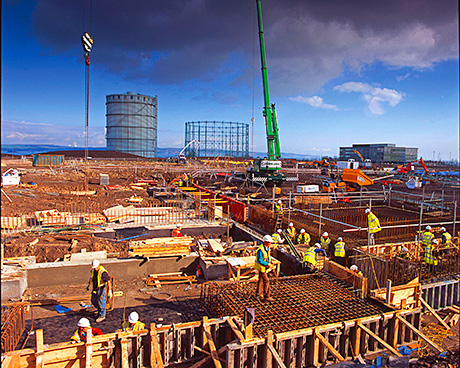
MORE construction professionals saw workloads rise in the last quarter than at any time since the end of 2007. But not in Scotland.
According to the latest RICS survey, 10% more surveyors in the UK reported rising workloads and identified private housing as one of the main drivers behind the boost. While still historically low, the improvement in housing would suggest that some of the government initiatives are beginning to breathe life back into parts of the nation’s property sector.
However, the improvement did not extend north of the border. Regional differences saw London, the South East and the Midlands enjoy increases in construction but Scotland and Northern Ireland continued to watch workloads slip. Those two areas remain “particularly depressed” and the picture shows no immediate signs of improving said RICS.
In Scotland surveyors reported weak prospects for future output and employment with the decline in workloads continuing across the country. Almost one in five expects workloads to fall over the next 12 months alongside a significant reduction in infrastructure projects.
The Scottish outlook is that it will take a significant shift in economic activity to turn the industry around, with lack of demand and accessible funding identified as key factors holding back the industry. Around 88% of professionals north of the border believe financial constraints are a key obstacle to development, with 74% percent citing insufficient demand.
Sarah Speirs, director of RICS Scotland, commented:
“It is disappointing that figures show a continued, steady decline in the construction industry and, despite government measures, financial constraints continue to be a barrier for growth.
“In order to boost the industry the Scottish Government must now move ahead with ‘shovel ready’ projects and invest in the infrastructure projects which can best benefit Scotland’s economy.”
Looking ahead, surveyors in England and Wales expect the more positive trend to continue. A net balance of 27% more respondents expect workloads to rise over the coming 12 months.
The increase in construction projects and the expectation of further gains, however limited, resulted in a rise in job expectations with 22% more surveyors anticipating employment levels rising over the coming year although that is unlikely to be matched by profits, which are expected to remain depressed.
Simon Rubinsohn, RICS chief economist, commented: “Although it’s far too early to start talking about a recovery in the construction sector, the rise in output at the beginning of the year is a little better news. The government’s attempts to stimulate the market seem now to be having some impact but there are still significant challenges to be overcome, in particular, the availability of finance and planning related issues continue to present obstacles to development.”
There is similarly bleak news, this time for Scotland’s small building firms, as another survey reveals falling workloads and rising costs have forced many companies to scale back their operations.
Nearly a third of Britain’s SMEs have shed staff since the turn of the year, says the Federation of Master Builders (FMB) and the latest statistics show over-all workloads are falling at the fastest rate since early 2012. The net balance for residential workloads was -23%, compared to -15% in the final quarter of last year, giving particular cause for alarm.
The composite regional indicator which combines workload, expected workload and enquiries, showed a net balance of -1% in Northern Ireland. This compares to a balance of -26 in the province in the final quarter of 2012 and signals a substantial improvement in the outlook for Northern Irish builders – at odds with the RICS findings for that area. In England the figure was -16% while in Scotland it plummeted to -20%.
Brian Berry, chief executive of the FMB, said: “Last year was a tough one for our members, but there were some encouraging signs in the final quarter of 2012 that the industry may be turning a corner. These latest survey results, however, paint a bleak picture, and our members are telling us that they are faced with the unenviable choice of putting up their prices or laying off staff.”
Workloads continue to fall, costs keep rising and credit conditions remain “extremely tough”. As predicted by members in the final quarter of 2012, the first three months of this year saw 30% of firms shed staff.
Image – Scotland is suffering as most of the UK reports an upturn in activity.








